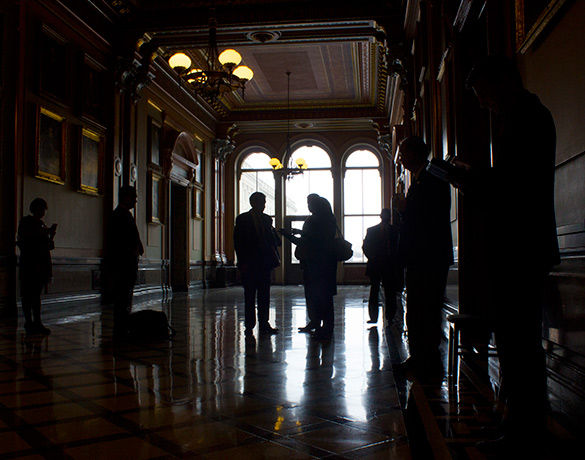Madigan’s Democratic lawyer sues to block redistricting reform referendum

May 12, 2016
An attorney who’s long been a close ally of Democratic House Speaker Michael Madigan has filed a lawsuit trying to block voters from considering a proposed constitutional amendment that seeks to remove some of the influence of partisan politics from how state House and Senate district boundaries are drawn.
The suit was brought by the People’s Map, the same group of prominent racial and ethnic minorities that sued two years ago to keep a similar referendum question off the 2014 ballot. Their attorney is Michael Kasper, general counsel for Madigan’s Illinois Democratic Party.
The legal move comes less than a week after the Independent Maps coalition filed more than 570,000 petition signatures with the State Board of Elections in the first step toward putting the proposed amendment on the Nov. 8 ballot — almost double the minimum required.
Advertisement
Dennis FitzSimons, chairman of the map coalition, accused “political insiders” of trying to deny voters “the chance to reform Illinois government.”
“Springfield insiders aren’t willing to risk those odds and would rather cynically preempt at the courthouse what they cannot win at the ballot box,” said FitzSimons, the former chairman and CEO of Tribune Co. and chairman of the Robert R. McCormick Foundation.
“Plain and simple, this lawsuit is a struggle for power. It is Illinois politicians struggling to retain the power to manipulate elections versus citizens demanding reform,” he said. “We knew this lawsuit would be the response to our submission of 570,000 petition signatures from Illinois voters, and we are ready to aggressively defend the constitutionality and fairness of the Independent Map Amendment.”
A change in the state’s redistricting process was one element of Republican Gov. Bruce Rauner’s “turnaround agenda,” and he has backed the map coalition proposal. The idea is that opening up the mapmaking process could lead to more competition and serve as a curb on the power of legislative leaders who can hold power for decades. Madigan, for example, has been speaker for all but two years since 1983.
Madigan spokesman Steve Brown on Thursday said neither the speaker nor the state Democratic Party is involved in the lawsuit.
Under the Independent Maps proposal, voters would be asked to put into the Illinois Constitution a multiphase plan on how legislative maps are drawn to reflect population changes after each federal census.
Currently, lawmakers get to draw up a new map that is subject to approval of the governor. That’s what happened after the 2010 census, when the Democrat-controlled legislature drew a map signed by then-Democratic Gov. Pat Quinn.
Advertisement*
But if lawmakers are unable to put together a map that could be signed into law, an eight-member panel of equal numbers of Democrats and Republicans is charged with drawing the new boundaries. If they fail, a ninth, tiebreaking panel member is chosen in a random drawing.
The prospect of a random draw to decide the map was initially thought by drafters of the constitution to be a way to force Republicans and Democrats to come together on a compromise. Instead, both parties have opted for the winner-take-all risk: Democrats won the tiebreaker and the map in 1981 and 2001, while a Republican name was drawn in 1991.
The complex Independent Maps proposal would create an 11-member commission with seven culled from a pool of 100 potential members along with four members chosen by each of the General Assembly’s leaders.
After public hearings, any map would require the approval of seven commissioners, including two Republicans and two Democrats. If the commission failed to approve a map, the chief justice of the Illinois Supreme Court and the top-ranking justice of the opposite party would jointly appoint someone to draw the new boundaries.
Under the Illinois Constitution and subsequent court rulings, petition-driven changes to the state’s governing document are vastly limited in scope, applying only to the structure and procedure of the General Assembly. That’s what sank a maps proposal in 2014, when the People’s Map group challenge was upheld by Cook County Circuit Judge Mary Mikva.
She ruled that provisions preventing any commissioner from holding various appointed or elected offices for 10 years was an unconstitutional limitation on eligibility to serve in the General Assembly. But she also opened the door to a renewed effort that could withstand a constitutional challenge.
The new lawsuit contends that the redistricting proposal does not meet the “structural and procedural” requirement.
It also alleges the proposal is unconstitutional because it imposes new duties on the state’s auditor general to pick a panel to review applicants to the commission, repeals the state Supreme Court’s jurisdiction over redistricting, imposes new duties on two members of the Supreme Court and removes the attorney general’s power to act in the state’s interests concerning redistricting.
The lawsuit also argues that the redistricting proposal unconstitutionally presents “separate and unrelated questions in a single ballot proposition.”
The Independent Maps coalition, a better funded and organized effort than the 2014 movement, had been expecting a legal challenge and has been raising money in recent weeks.
___
(c)2016 the Chicago Tribune
Visit the Chicago Tribune at www.chicagotribune.com
Distributed by Tribune Content Agency, LLC.
Advertisement








